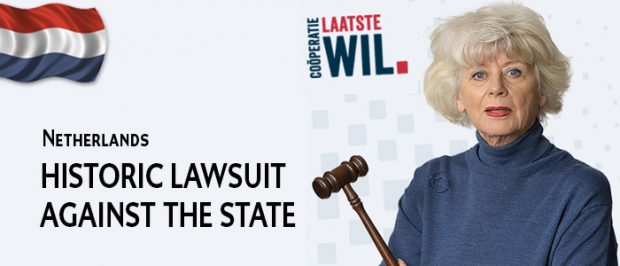October 9, 2022
Landmark Dutch Euthanasia Court Case
The Landmark Dutch EuthanasiaCourt Case concerning Coöperatie Laatste Wil v State of the Netherlands will be livestreamed starting Monday 10 October.
On Monday 10 October 2022 at 09.30, the District Court of The Hague will hear the lawsuit of the Coöperatie Laatste Wil (CLW) against the State. CLW and twenty-nine individual plaintiffs claim that the State is acting unlawfully by maintaining the criminal ban on assisted suicide.
Blenheim (lawyers) is assisting CLW in this case. We are doing so together with Vis & Van Reydt. Blenheim represents the interests of the plaintiff and has no personal opinion or interest in the substance of this case.

The Background
For some time, Blenheim and Vis & Van Reydt have represented the CLW and 29 co-claimants against the Dutch State.
Legislation prevents Dutch citizens from being able to take control over end-of-life decisions themselves.
Should you, as a Dutch citizen, be involved in assisted suicide, you are punishable.
Allowing a last-will remedy is also blocked by the Dutch state.
The only route to legal termination of life is through a euthanasia doctor, but this is tied to hopeless and unbearable suffering with a medical basis.
CLW is fighting in this case for Dutch people who are also not suffering hopelessly.
Dutch people who consider their lives to be complete or wish to leave life independently, with the support of their loved ones.
According to CLW, older people who are not terminally ill should be able to decide for themselves when the right moment for death has come and the way in which they themselves, in their own direction, say goodbye to life.
The Process
The process so far can be called unique.
Because it is a sensitive and intimate subject that touches, hurts and/or saddens many people, it was decided to handle it very thoroughly and with respect for next of kin.
But also with respect towards people and parties with a different opinion on this subject.
The process so far has therefore not only made use of input coming from CLW members and ambassadors, but has also included discussions with a large number of people involved who want to retain their own control over their end of life, as well as next-of-kin who have been confronted with the harsh reality of the ban on assisted suicide.
Next-of-kin who, in many cases, indicated that this very ban caused their loved one to die in solitude.
This was done not to get a one-sided picture from an impersonal foundation, but to tell the real stories and show what current legislation does to people affected by it. This yields very impressive stories.
The European Context
When we started this process, there was little case law on the matter.
The European Court has for a long time recognised that the fundamental right to privacy also protects the decision about one’s own end of life, as well as when and how.
But during the preparation of the trial, rulings by the highest constitutional courts from Germany and Austria followed in the same vein, with the outcome – in short – being that a ban on (assisted) suicide is unconstitutional.
This has only confirmed to the CLW, the co-plaintiffs and also to us that the approach in this trajectory is the right one and that it is also time in the Netherlands for real legal protection over the end of one’s own life in one’s own direction.
The hearing on 10 October
Due to the enormous interest in this case, the courtroom is completely full.
As an alternative and because of the huge interest, there is also a live stream published by De Rechtspraak.
The hearing can be watched live via the stream here.
As there is a great demand and need for clarification and explanation of what will be discussed during the hearing, the CLW has rented a large room in a hotel next to the court where the live stream can be followed and where additional clarification will be given by Blenheim and Vis & Van Reydt lawyers.
This will give everyone a chance to follow the hearing, but also to ask questions of lawyers who know the substance of the case.